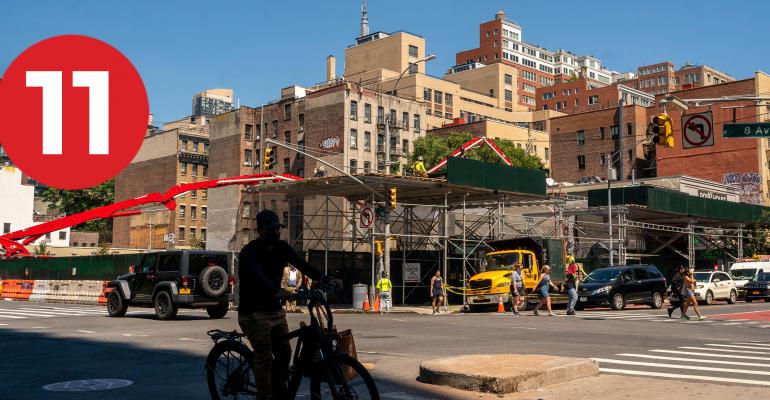- Affordable-Housing Projects Derailed as Developers Struggle for Financing “NRP started this year with plans to finance and start building nearly 1,900 affordable housing units. Now the organization is postponing plans for at least 200 of those units while it tries to line up the additional financing.” (The Wall Street Journal)
- CRE Industry Steps Forward For Some Women, Stalls For Others “Women in commercial real estate, particularly those in the upper echelons of management, have made gains when it comes to equity and pay parity in the workplace, but talent pipelines, mentorship and diversity in leadership ranks still leave something to be desired. That’s according to a pair of new surveys on the careers and perceptions of women in commercial real estate as the industry goes through a generational upheaval in the aftermath of a pandemic and racial reckoning that have changed the way workplaces work.” (Bisnow)
- NY mask mandate lifted on subway and public transportation, Gov. Hochul announces “Transit riders will no longer be required to wear masks on New York City subways, buses, and commuter rail lines, Gov. Kathy Hochul announced on Wednesday, bringing an end to one of the region’s last surviving mask mandates in public places.” (Gothamist)
- BlackRock CEO Larry Fink thinks he has a solution to inflation: Bring people back to the office “BlackRock is joining other Wall Street banks in pushing for a return to the office. Both Goldman Sachs and Morgan Stanley said that after Labor Day they would remove COVID restrictions on in-person work, such as requiring vaccinations or regular COVID tests, in their drive to get employees back to the office.” (Fortune)
- How the Inflation Reduction Act will affect the multifamily sector “The base tax credit for the Energy Efficient Commercial Buildings Deduction, which applies to buildings that meet or exceed 25% of ASHRAE standards put in effect three years before a building enters service, will be raised by $.50 to $1 per square foot. Bonuses are also available for meeting prevailing wage and apprenticeship requirements.” (Multifamily Dive)
- Proptech firm Juniper Square lays off 14% of staff “It is not clear how many employees will be jettisoned. The firm declined to provide an exact number. According to LinkedIn, the company has 469 employees.” (The Real Deal)
- PwC real estate head: How companies evaluate office-space needs if there's a recession “A survey conducted Aug. 1-5 by London-based PricewaterhouseCoopers LLP found 22% of companies are scaling back their investment in real estate. That's more than any other business area.” (The Business Journals)
- Brookfield Sues 315 West 33rd Street Tenants, Claiming Illegal Airbnb Operation “Brookfield sued tenants Mei Wu, Rui Wang, Wei Zheng Peng, Aaron Chan and Hongrui Zheng on Friday after the group allegedly rented nine apartments through Airbnb in the 333-unit Midtown West building, dubbed The Olivia, and refused to stop even after Brookfield found out, according to court records.” (Commercial Observer)
- The Supply Chain Broke. Robots Are Supposed to Help Fix It. “A day spent wandering the Home Delivery World trade show inside the Pennsylvania Convention Center revealed how supply chain companies are pursuing automation and flexible staffing as antidotes to rising wages. They are eager to embrace robots as an alternative to human workers.” (The New York Times)
- Rezoning for more housing costs developers a fortune: report “The report, which examined 171 private zoning applications filed between 2014 and 2017, found that the median time for a land use application to finish the city’s approval process was two and a half years. Some 80 percent of that was spent on pre-certification and environmental review.” (The Real Deal)
- Why Climate Change Should Take More Real Estate in Industry Conversations “While repairing catastrophic property damage has never been simple, it is no secret that the magnitude — and the costs — of these events is expanding due to climate change. To ensure that owners can recover from these devastating natural catastrophes, the insurance industry requires the participation of insurers, reinsurers and sovereign governments. However, there is another segment of people who are invested in the outcomes of climate change: those who are involved with the insurance-linked securities (ILS) market.” (Corelogic)
0 comments
Hide comments





